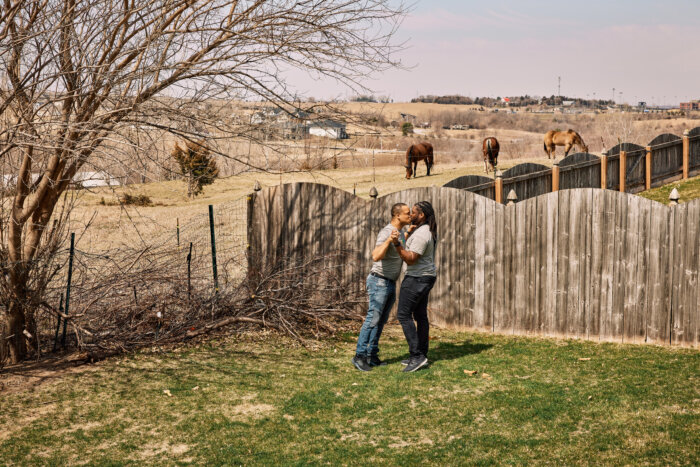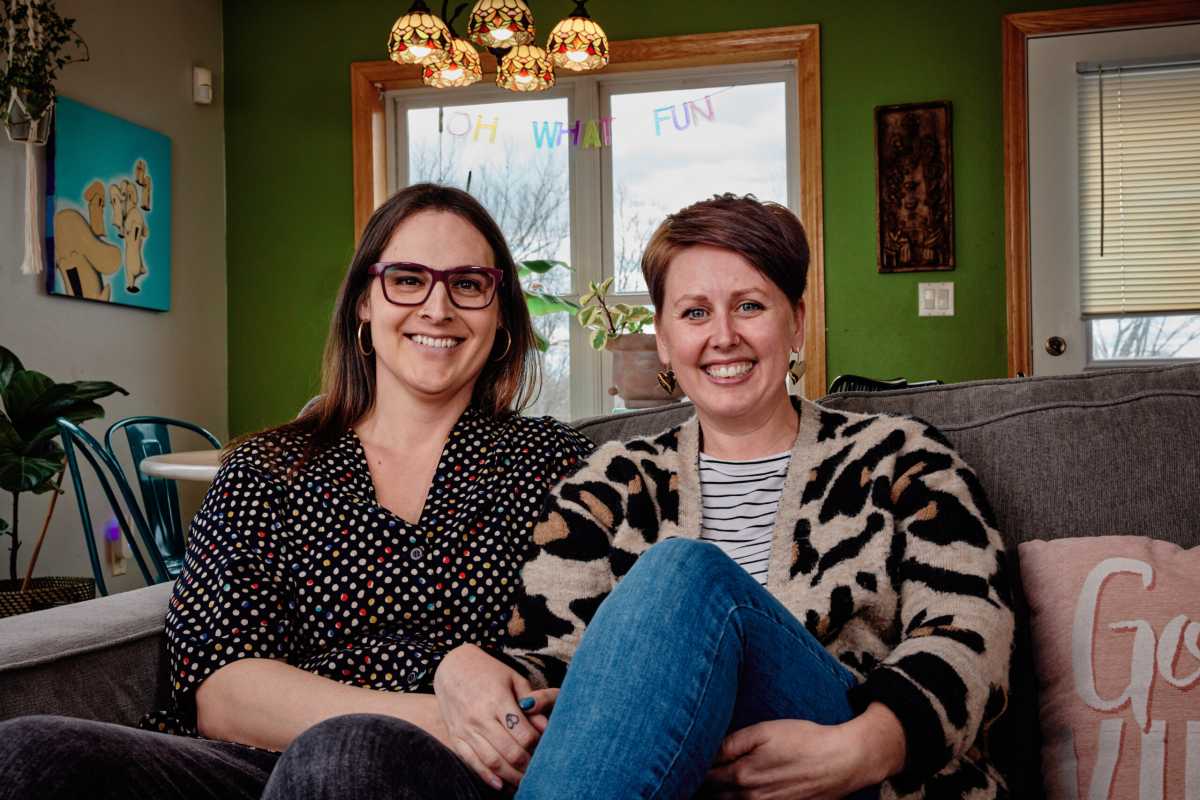The eye-opening documentary, “We Live Here: The Midwest,” presents a handful of case studies that reflect LGBTQ lives in America today. The families profiled are all shown with dignity as they describe hardships they face in their communities, churches, schools, and with their families. Most of the interviewees explain how they cling onto Midwestern values, such as kindness, even as they fail to receive compassion from their neighbors.
“We Live Here” opens with the trans Nia and queer Katie, who live in Iowa with their five children. They talk about their experiences and consider the changing politics. Mario and Monte, a Black gay couple in Nebraska, have a baby daughter through a surrogate and find friends in their community, although Mario’s mother still struggles with accepting them. Courtney and Denise, a lesbian couple in Kansas, face issues with their son, Marek, being bullied in school. In contrast, in Ohio, Russ and Mark create a safe space for LGBTQ students. Rounding out the documentary are two stories from Minnesota. One features Representative Heather Keeler, a queer indigenous woman, fighting for legal change. The other has two trans women, Jenn and Deb, reconnecting with Jenn’s children after her divorce.
Gay City News spoke with out lesbian director Melinda Maerker about her insightful documentary.
How did you find the subjects for your film, and what did they teach you about being out in the heartland?
Finding the subjects was not easy. A lot of people, frankly, were concerned they would have retribution in their communities, and understandably so. As a lesbian in Los Angeles, who has lived in a nice gay bubble, I always imagined that if people in the heartland are facing intense discrimination, why stay? But there are many reasons to stay. I felt a sense of community and rootedness in the land and not wanting to have to leave. They like living there for many good reasons but want to be respected within their communities.
In the first segment, Katie says folks are “welcoming but not affirming, which is more damaging.” What observations do you have about the attitudes toward LGBTQ folks in the Midwest?
There was a great irony in going to the Midwest, a place we associate with family value. It is interesting when those values don’t apply to all families. Marek in Kansas says, “I embody a lot of wonderful Midwest values: I am kind and care about my neighbors, but those values need to be sincere.”

Tolerance is not acceptance…
Exactly. To that point, when we started making the film in 2020, we were starting to get concerned. Marriage equality was available to everyone in our country, but it was as though there was a Don’t Ask, Don’t Tell policy. The minute that marriage equality became legal, and we are celebrating, and we have these rights just like non-queer people, that’s when the backlash happened. That, and an election that was problematic for most of our community. When something is codified and legitimized, we have more backlash.
Likewise, several subjects grapple with the gay and God issue of being out and wanting to be involved in the church. Did you see any positive religious acceptance of queer people in the Midwest?
Katie’s point that it is more damaging to be accepting but not affirming is quite true. Having faith, and a community in which to express your faith, is very important to gay people in the Midwest and the South. It is part of the culture. For Katie, it was heartbreaking and she’s still grappling with that. And for Nia, you have this idea, “If someone doesn’t want me, I don’t want them.” For Katie, it’s, “They don’t want me, but I miss them.” That felt honest and profound. Nia found a new community. Being able to embrace different people gave her what religion was for her. Mario and Monte, who had been kicked out of a church in Colorado — the pastor asked them to annul their marriage — in Nebraska, they went to church. But it was a Don’t Ask Don’t Tell situation. Everyone knows we are a gay family, but we can’t say it. They are continuing to be part of a community that loves you but does not affirm you.
Why do folks like Nia and Katie, or Jenn and Deb choose to live in a community where they face hate and might lose rights? How do your subjects feel they belong?
I think it’s multifaceted. For Denise and Courtney, it is the land itself. They moved to the country to ranch goats and raise food, and they feel part of the landscape. Again, Nia finding a queer community, that gave them a sense of belonging. Greg in Ohio was a student of Russ’. His father hasn’t spoken to him in 3 years. He points out that there will always be people who reject you, but you will find people who will cheer you on. He speaks to that resiliency. Belonging doesn’t come automatically, but you appreciate it more because you have to find it, and make it, and those bonds can be very strong because of that. If you are staying on land when you are not affirmed, you have a tie to land. HULU was great to market this film as “courageous” families, not as “queer” families, because that is what comes first. They are resilient to want to stay where they and they are sharing their stories in a real, often complicated way.
I think the most interesting takeaway from your documentary is about how families react and reform. In some cases, your subjects are estranged from their birth families; in other cases, they are working on acceptance; and in one case they are re-forming. Can you talk about this?
Marek said that there is a positive aspect of having to deal with difference growing up; it can make you more aware of others and be more comfortable with who you are. I asked him how has having lesbian parents affected him, and he was clear that it has made him more open minded, because he has had to see them struggle. Discrimination is horrible, but the silver lining is when you are being discriminated against, you find your own community and feel more open about who you are because you are already being discriminated against.
The hope with your documentary is that it changes minds. Certainly, members of the LGBTQ community will appreciate the messages in your documentary, but your film also provides understanding as people are accepting once they get to know couples like Mario and Monte. As Courtney or Denise says, “There is a resistance to change.” What are your thoughts?
Of course, there’s a resistance to change. That’s human nature. But we become more courageous people by going beyond that. That’s what makes us good people — go beyond something initially uncomfortable, just because it’s different. I hope to reach the people in the middle. Extremists are extremist, and they will never watch the film. But it’s the people who think issues don’t apply to me… To me it’s “think farther;” it is not change your mind, but open your mind.
“We Live Here: The Midwest” | Directed by Melinda Maerker | Available December 6 on HULU



































